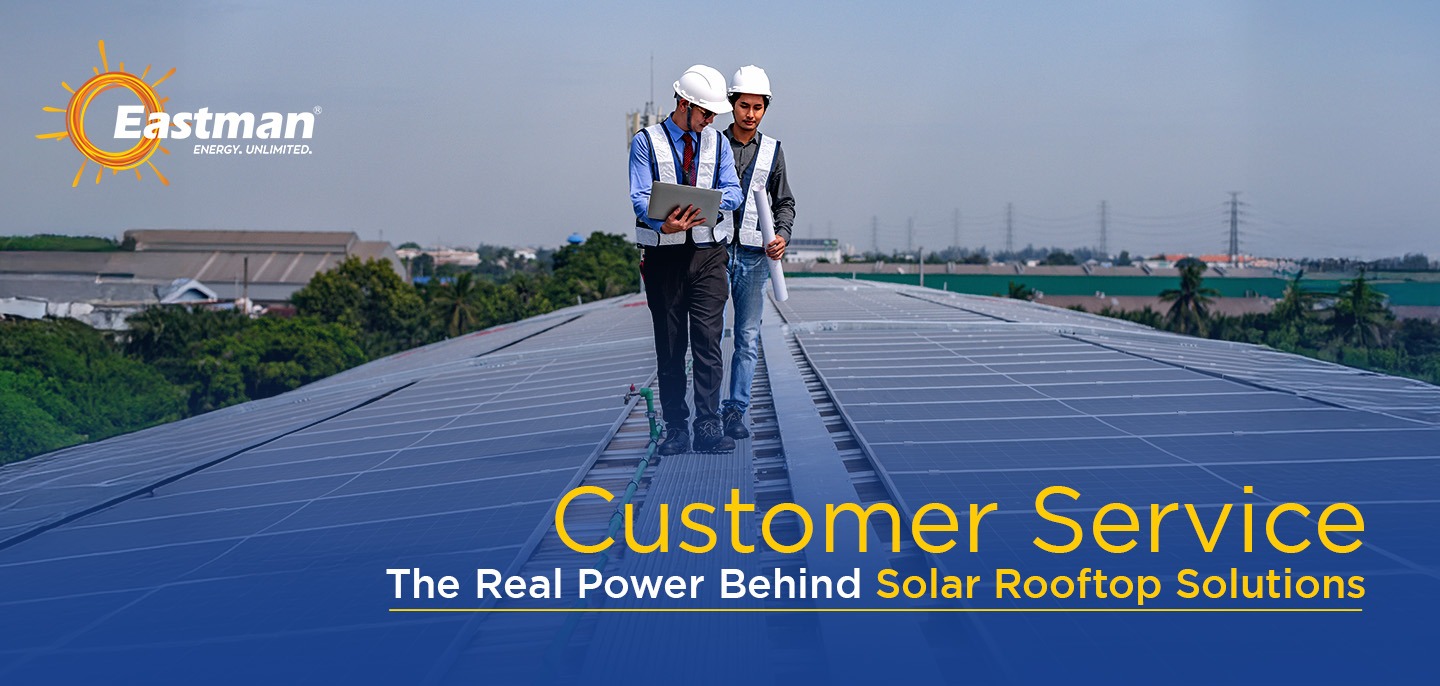
Customer Service: The Real Power Behind Solar Rooftop Solutions
Why is Customer Service Important in Solar Rooftop Solutions?
In today’s world, where clean energy is becoming a necessity, solar rooftop solutions have emerged as a smart and sustainable choice for homeowners and businesses. But while solar panels and inverters do the job of harnessing energy from the sun, it’s the quality of customer service that truly powers the overall experience. From the first consultation to long-term maintenance, excellent customer support is essential, especially in emerging markets like the Middle East and Africa, where many users are new to solar technology.
Let’s explore why customer service is the backbone of a successful solar rooftop solution.
Guidance in Choosing the Right System
Not all rooftops or energy requirements are the same. One of the first roles of a good customer service team is to provide expert consultation and load analysis. By understanding the customer’s daily energy consumption, rooftop space, and budget, the service team can suggest the most appropriate solution—be it on-grid, off-grid, or hybrid. This guidance prevents under-sizing or overinvestment and sets the foundation for a successful installation.
Smooth Installation Experience
Installing a solar rooftop system involves several steps: structural assessment, electrical connections, safety compliance, and sometimes government approvals. A proactive customer service team ensures smooth coordination between engineers, electricians, and installers, while keeping the customer informed at every stage. This creates a stress-free and timely installation experience.
After-Sales Support & Troubleshooting
A solar system is a long-term investment, typically lasting 20 to 25 years. Over this time, users may encounter issues like inverter errors, sudden shutdowns, or reduced energy generation. Responsive customer service makes all the difference. Quick troubleshooting, remote diagnostics, and timely technical support help maintain consistent performance and user confidence.
Performance Monitoring & Warranty Claims
Most modern solar systems offer real-time performance tracking through apps or web dashboards. However, not all users are familiar with technical data. Customer service plays a crucial role in helping users interpret energy reports, identify efficiency drops, and take corrective action. In the case of equipment failures, the service team should also manage hassle-free warranty claims and replacements, ensuring minimal downtime.
Customer Education & Maintenance Tips
Educating customers about basic maintenance, such as when to clean solar panels, how to monitor inverter lights, or how to conserve energy, can significantly improve system longevity. Good customer service includes training and easy-to-understand guides that empower users to manage their systems independently.
Building Brand Reputation & Referrals
Happy customers become brand ambassadors. When users have a positive post-sales experience, they’re more likely to recommend the brand to friends, family, or social networks. This kind of organic promotion builds trust and enhances brand credibility, especially in local markets where word-of-mouth matters.
Handling Complaints or Escalations Professionally
Even with the best products, issues may arise. What truly defines a good company is how they respond when things go wrong. Prompt, respectful, and transparent handling of complaints or escalations ensures customer satisfaction and brand loyalty. A professional service team can turn a negative experience into a long-term relationship.
Importance of Customer Service in Emerging Markets (Middle East & Africa)
In Middle Eastern and African countries, solar adoption is growing rapidly, but many customers are first-time users. They require more education, local language support, and trusted service advisors. In these regions, excellent customer service isn’t just a bonus, it’s a necessity. It builds trust, encourages adoption, and ensures the system is used effectively in the long term.
Eastman’s Customer-First Approach in Solar Rooftop Solutions
Delivering a quality solar rooftop system goes far beyond installation it’s about building lasting relationships through exceptional customer service. Our dedicated support team is trained to assist customers at every stage, from system selection and installation to long-term maintenance and performance monitoring. With a strong presence in India, the Middle East, and Africa, Eastman ensures local, responsive service through trained technicians, timely troubleshooting, and proactive guidance.
Eastman is committed to making the solar journey seamless, transparent, and worry-free because we know that great service is the real power behind solar energy.
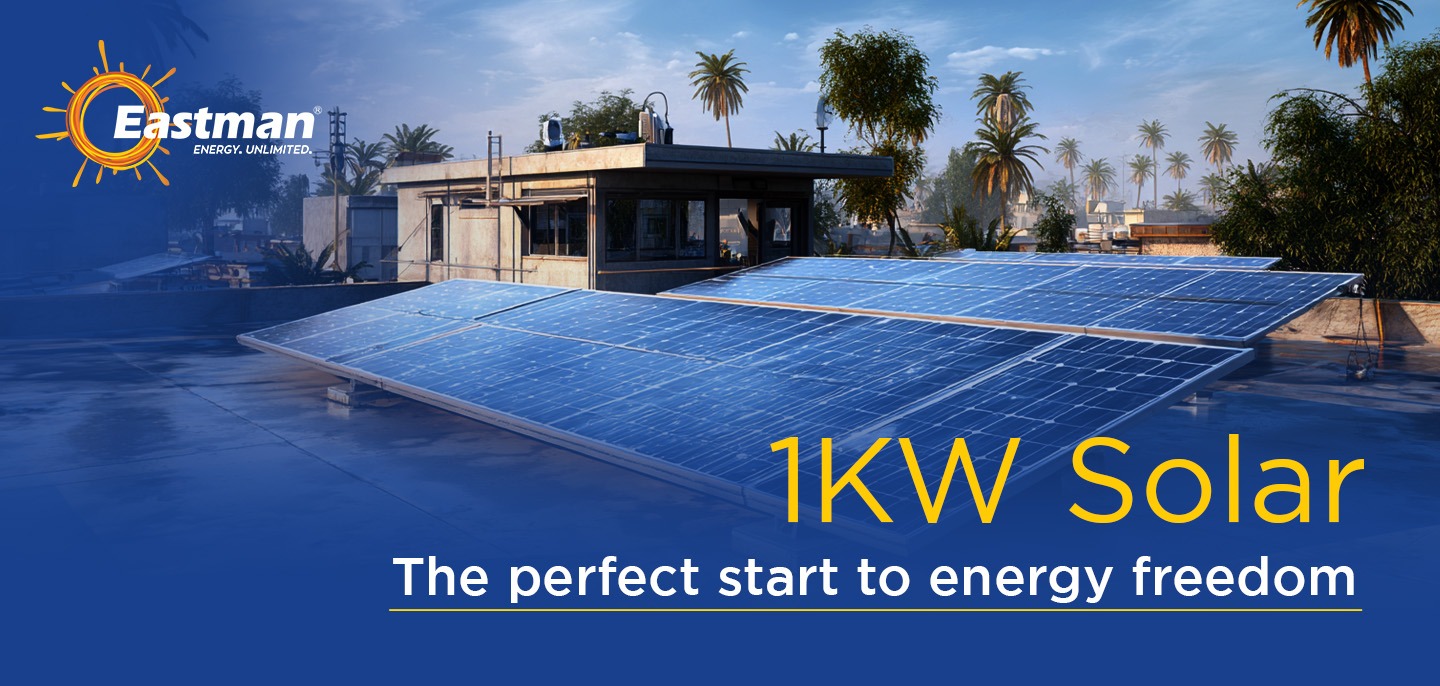
1KW Solar: The perfect start to energy freedom
What Can You Really Power with a 1KW Solar System?
Thinking about switching to solar? A 1KW solar system is a great way to begin your clean energy journey. It's compact, affordable, and perfect for small homes, shops, or offices looking to reduce electricity bills and become energy independent.
In this blog, we will give you a complete overview of what a 1KW system can do, what it includes, and how you can benefit especially in the sun-rich regions of the Middle East and Africa.
What Can You Run with a 1KW Solar System?
A 1KW system can generate around 4 to 5 units (kWh) of electricity per day, depending on sunlight conditions. Here's what it can typically power:
- 3-4 LED lights
- 3-4 ceiling/table fans
- 1 LED TV
- 1 small refrigerator (energy-efficient)
- Mobile and laptop charging
- Wi-Fi router
Note: Running heavy appliances like air conditioners, washing machines, or water heaters on a 1KW system is not recommended.
What Equipment Do You Need for a 1KW Solar System?
To build a fully functional 1KW solar setup, you'll need the following components:
1. Solar Panels (PV Modules)
- Typically, 3-4 panels of 330W each
- Total: ~1000W output capacity
2. Solar Inverter
- Converts DC from panels into AC electricity
- Choose from off-grid, grid-tie, or hybrid inverters
3. Battery (Optional but Recommended)
- Stores excess solar power for use during night or power cuts
- 12V, 100Ah-150Ah recommended
4. Charge Controller
- Regulates voltage/current from solar panels to battery (if not integrated with inverter)
5. Mounting Structures & Wiring
- Durable, weatherproof mounting for panels
- Copper wiring, conduit, connectors, and safety fuses
Scenario with Battery: Power Day & Night
Including a battery in your 1KW system ensures uninterrupted power, especially in regions with:
- Frequent power cuts
- No grid access
- Night-time energy requirements
A 12V 150Ah battery can store around 1.8 kWh of energy, enough to run your essential appliances for 4-6 hours after sunset.
Pro Tip: In off-grid areas across Africa and remote parts of the Middle East, a 1KW system with battery backup is ideal for ensuring energy self-reliance.
Things to Keep in Mind While Installing a 1KW Solar System
- Rooftop Space: You will need approx. 80-100 sq. ft. of shade-free space.
- Sunlight Access: Panels should face the sun for maximum exposure (south-facing in northern hemisphere).
- System Type: Choose grid-tie if you want to reduce bills, off-grid if there's no grid access, or hybrid for the best of both.
- Local Compliance: Ensure your installer follows local electrical codes and safety standards.
- Professional Installation: Always hire certified technicians to avoid performance or safety issues.
Return on Investment (ROI):
- Save ~$10-$15 per month on electricity
- Payback period: 5-6 years
- System lifespan: 20-25 years
- Maintenance cost: Minimal
Why It's Perfect for Middle East & Africa
With abundant sunshine and growing energy demand, a 1KW solar system is a smart, scalable, and affordable solution for homes, clinics, schools, and small businesses in countries like Saudi Arabia, UAE, Egypt, Nigeria, Kenya, and South Africa.
Whether you are in a bustling city or a remote village, Eastman's reliable solar solutions help you harness the power of the sun efficiently and affordably.
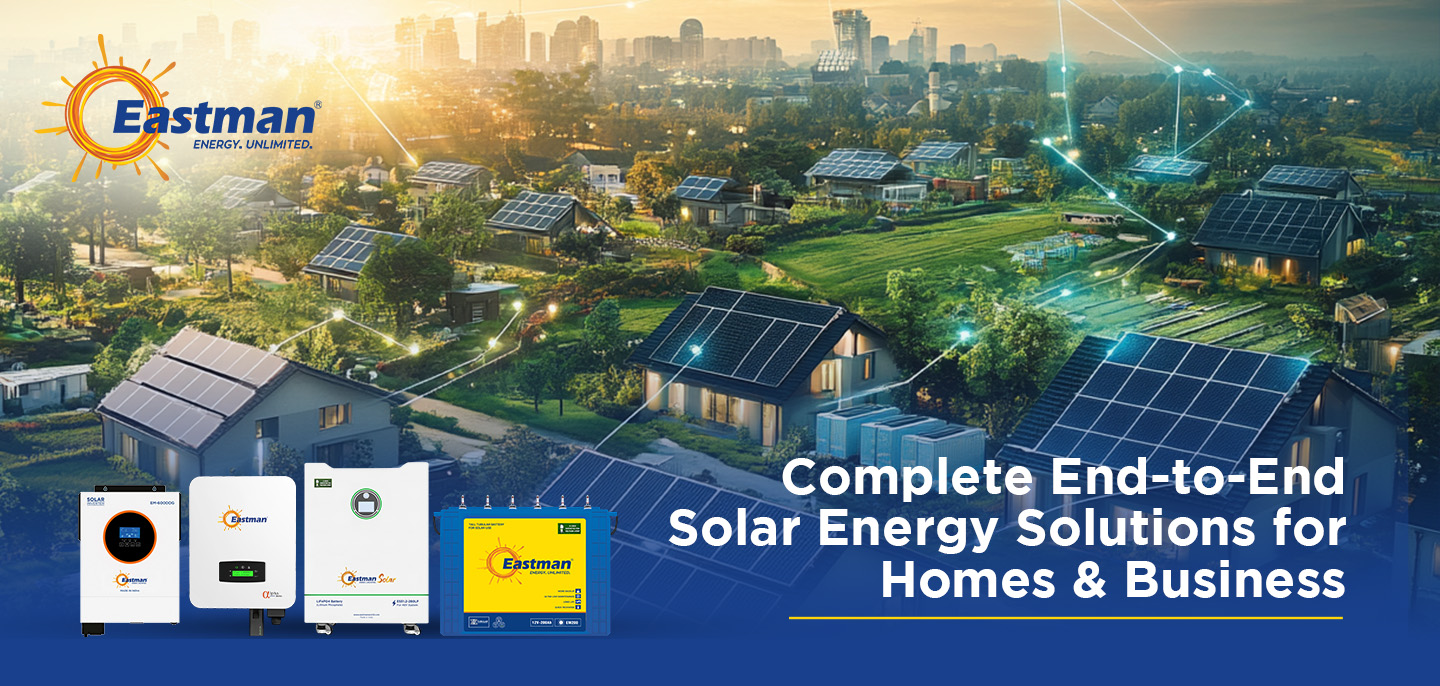
Complete End-to-End Energy Solutions for Homes & Business
As the world rapidly shifts toward clean energy, the need for reliable, integrated solar solutions is more critical than ever. Eastman emerges as a ONE-STOP SOLUTION for every Solar need, offering end-to-end solar energy products that seamlessly integrate solar panels, inverters, and batteries, even when sourced from multiple manufacturers.
In today’s fragmented solar market, buyers often end up juggling inverters from one brand, panels from another, and batteries from a third, leading to performance mismatches, incompatible warranties, and operational hiccups.
Eastman simplifies solar adoption by delivering a complete solar ecosystem, managing everything from design and engineering to deployment and after-sales service. It eliminates complexity by serving as a single-window solution, ensuring system compatibility, peak performance, and comprehensive support.
A Complete Solar Ecosystem Under One Roof
Eastman’s comprehensive product portfolio includes:
Solar Inverters by Eastman
- Off-Grid Inverters: Designed for remote areas or homes with unreliable power supply.
- Grid-Tie Inverters: Enables excess solar power to be exported to the grid.
- Hybrid Inverters: Combines the best of both worlds. Ideal for solar + battery setups.
Solar Battery Solutions
- Lithium-ion Batteries: Smart, long-lasting, compact, perfect for modern homes and businesses.
- Tubular Lead-Acid Batteries: Robust and cost-effective, ideal for high-temperature zones and rural areas.
Together, these solutions deliver energy independence, backup power, and long-term cost savings for residential, commercial, and industrial users alike.
Backed by Strong In-House Manufacturing Capabilities
At the core of Eastman’s reliability is its vertically integrated manufacturing infrastructure that enables exceptional quality control, faster innovation, and consistent delivery.
- 4 Power Electronics Manufacturing Facilities: Producing high-performance inverters and controllers.
- 3 Lead-Acid Battery Manufacturing Units: Known for reliability, endurance, and affordability.
- 1 Lithium-ion Battery Manufacturing Plant: Delivering the future of compact and smart energy storage.
This in-house ecosystem maintains tight control over quality and supply chains, reduces lead times, and enables rapid innovation based on customer feedback and market demands.
Made in India, Trusted Worldwide
Eastman is proud to align with the "Make in India" initiative, reinforcing its commitment to national growth while competing on a global stage. Every Eastman product reflects:
- Locally Designed Precision Engineering
- World-Class Quality Benchmarks
- Competitive Pricing Backed by Local Manufacturing
This approach not only supports job creation and self-reliance but also ensures global customers benefit from best-in-class solar solutions.
Global Vision: Focus on Middle East & Africa
With growing solar demand in emerging markets, Eastman is accelerating solar adoption across the Middle East and Africa through:
- Tailored energy systems suited for high-temperature conditions
- Localised service and faster support
- Affordable, scalable solar infrastructure for both urban and off-grid communities
By providing affordable, reliable, and scalable solar energy systems, Eastman is playing a vital role in the energy transformation across these emerging markets.
Driving the Future of Green Energy Adoption
At Eastman, sustainability isn't just a trend but a guiding principle, a core mission. Every product, solution, and service are designed to accelerate the shift toward clean energy by building a greener future through:
- Minimising dependency on fossil fuels
- Making solar power accessible in underserved and remote regions
- Supporting global efforts toward achieving net-zero emissions
Whether it's a rural home seeking reliable backup or a large enterprise committed to reducing its carbon footprint, Eastman delivers solutions that empower a cleaner, greener tomorrow.

Inside Eastman's Global Distribution Network Expanding to 140+ Countries
In an era where global presence defines the success of industrial brands, Eastman has emerged as a powerful name in energy solutions, expanding its footprint to over 140 countries across six continents. From the bustling markets of Asia to the growing energy demands in Africa and the evolving infrastructure of Latin America, Eastman’s global distribution network ensures that reliable power is never out of reach. This blog takes a closer look at how Eastman built and continues to scale one of the most efficient, responsive, and widespread battery distribution systems in the world.
Eastman is a leading manufacturer of advanced energy storage solutions, specializing in innovative batteries and power systems that serve residential, commercial, and industrial applications. Renowned for its commitment to quality, sustainability, and customer satisfaction, Eastman has grown from a national brand into a global energy partner. With a strong focus on R&D and thermal management technologies, Eastman delivers high-performance batteries that are trusted in over 140 countries empowering homes, businesses, and critical infrastructure projects around the globe.
A Network Engineered for Reach and Reliability
Eastman's international expansion didn’t happen overnight it’s the result of strategic planning, local partnerships, and a deep understanding of regional energy needs. The company’s distribution model is built on a decentralized yet coordinated approach that leverages regional warehouses, trained service engineers, and country-specific compliance teams. This ensures fast delivery times, localized technical support, and seamless after-sales service across time zones.
Local Presence, Global Strength
From Lagos to Luxor, Eastman operates with a local-first mindset. Its sales and service networks in countries like Nigeria, Yemen, Bangladesh, and Nicaragua are customized to meet local power challenges — whether it’s frequent blackouts, extreme temperatures, or fuel shortages. Eastman invests in training local teams, enabling distributors with the right tools and knowledge to serve their markets effectively. This localized support network has been instrumental in building trust and ensuring customer satisfaction at every level.
Powered by Innovation and Sustainability
Beyond distribution, Eastman is focused on building a future-ready infrastructure. Its commitment to sustainability is reflected not just in the products — which include recyclable batteries and energy-efficient systems but also in its supply chain. Eastman’s distribution channels are optimized to reduce carbon footprint, streamline inventory flow, and improve energy access for underserved regions.
What’s Next?
With a clear roadmap to expand into emerging markets and strengthen existing partnerships, Eastman continues to set benchmarks in global energy distribution. As the world transitions to more renewable and efficient power solutions, Eastman’s expansive distribution network positions it as a vital player in the global energy landscape.

How Eastman Energizes Small Businesses in Africa?
Introduction
In many regions of Africa, the backbone of economic activity is driven by small and medium-sized enterprises (SMEs). From bustling barbershops in Lagos to street-side food vendors in Nairobi, these businesses power daily life, support families, and fuel local economies.
Yet one challenge consistently threatens their productivity is unreliable access to electricity.
At Eastman, we believe that energy is not just a utility it’s a catalyst for progress. That’s why we’ve made it our mission to empower African entrepreneurs and households with dependable, smart, and sustainable energy solutions.
In regions where power outages are frequent and unpredictable, business owners are often forced to halt operations, leading to:
- Lost income during blackout hours
- Spoiled goods due to a lack of refrigeration
- Missed customer opportunities from service interruptions
Expanding Impact: Clean Cooking for Off-Grid Communities
Our commitment to energy transformation doesn’t stop at business. This month, Eastman proudly hosted a live demonstration of our solar-powered pressure cookers showcasing how clean, renewable energy can uplift daily life, especially in underserved and off-grid areas.
Eastman is Powering the Future of Clean Cooking with Solar!
The demonstration was more than a product showcase. It was a vision in action where cooking becomes smoke-free, time-saving, and eco-friendly, powered entirely by Eastman Off Grid Inverter.
- Bridging the Energy Gap
We’re extending modern cooking solutions to households that previously depended on firewood or charcoal.
- Sustainable Impact
Solar-powered cooking is greener, healthier, and significantly reduces indoor air pollution improving health outcomes.
- Empowering Households
Families save time and money while gaining the convenience of modern electric cooking.
This aligns with Eastman’s vision of the productive use of energy using clean power not just for lighting, but for cooking, working, and living better.
Conclusion: Powering Progress, One Community at a Time
Eastman is proving that energy access changes lives. Our solutions don’t just keep the lights on they enable business growth, cleaner kitchens, healthier families, and more resilient communities.
Whether you’re an entrepreneur navigating daily outages or a family seeking smoke-free cooking, Eastman is here to power your journey reliably and sustainably.

Power Cuts & Rising Tariffs: Why Households are Switching to Solar + Storage Systems
In today’s energy landscape, millions of households across emerging and developed markets are grappling with two persistent challenges frequent power outages and soaring electricity tariffs. This dual burden is prompting a major shift in how family’s source and consume energy. At the forefront of this transformation is the adoption of solar storage systems, a solution that promises reliability, autonomy, and cost-efficiency.
The Problem: Unreliable Grids & Expensive Power
Power cuts, often caused by aging infrastructure, fuel supply issues, or grid instability, disrupt daily life, damage appliances, and create safety risks. In many regions, especially in parts of Africa, Southeast Asia, and Latin America, blackouts have become a daily norm.
At the same time, rising electricity tariffs are straining household budgets. Utility prices are increasing due to global fuel price volatility, government subsidy cuts, and the cost of maintaining outdated grid systems. For many families, these recurring expenses are unsustainable in the long run.
The Solution: Solar Energy Paired with Battery Storage
Solar power alone offers relief during the daytime, but when paired with energy storage, it becomes a 24/7 solution. Solar + storage systems enable households to
- Store excess solar energy generated during the day
- Use stored energy at night or during power outages
- Avoid peak-time electricity charges
- Gain independence from grid unreliability
This combination delivers not just power, but peace of mind, allowing families to take control of their energy future.
Eastman’s Smart Storage Solutions for Every Home
Eastman is empowering households to embrace energy independence through its advanced Lithium Battery and Off-Grid Inverter solutions. Designed for durability, safety, and high performance, Eastman Lithium Batteries provide seamless energy backup with faster charging, longer life cycles, and zero maintenance. Paired with Eastman’s Off-Grid Inverters, which are optimized for solar applications, users can effortlessly transition between solar, battery, and grid power ensuring uninterrupted supply during outages and maximizing solar utilization. With in-house manufacturing and a "Made in India" commitment, Eastman delivers both reliability and affordability to homes across the globe.
Long-Term Benefits for Households
- Cost Savings: Reduce monthly electricity bills and protect against future tariff hikes.
- Energy Security: Maintain power during grid failures or natural disasters.
- Sustainability: Lower carbon footprint and support global climate goals.
- Home Value: Solar-equipped homes are often more attractive in resale markets.
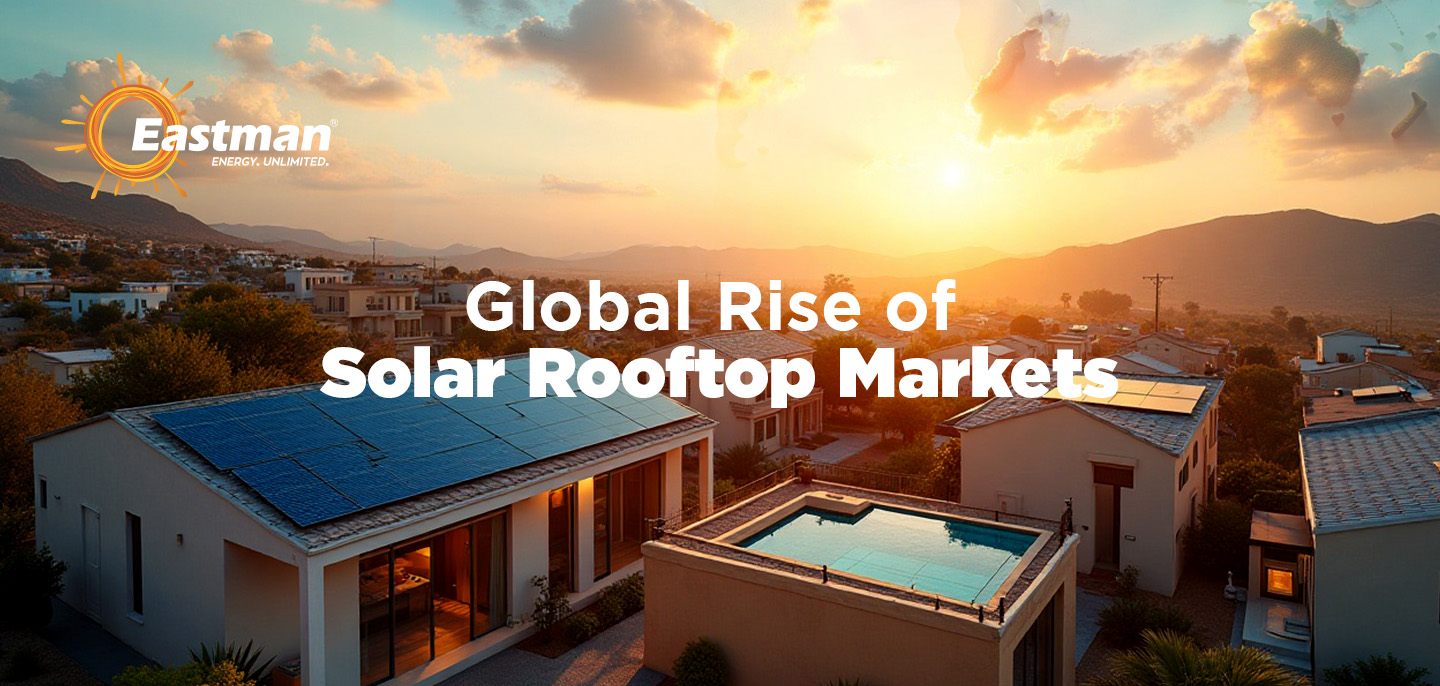
The Rise of Solar Energy for Residential Rooftop Segment in Emerging Markets: Opportunities in MEA & LATAM
As the world transitions towards cleaner energy sources, residential rooftop solar systems are emerging as a transformative solution particularly in the Middle East & Africa (MEA) and Latin America (LATAM). These regions, blessed with abundant sunlight and rapidly growing energy demands, are witnessing a significant uptick in solar adoption. Governments, private sectors, and local communities are recognizing the potential of decentralized, renewable power to bridge energy access gaps and stabilize rising electricity costs.
Why Rooftop Solar is Gaining Ground
The residential rooftop segment has seen accelerated growth due to a convergence of factors
- Decreasing Solar Technology Costs: Over the last decade, the cost of solar panels, inverters, and storage systems has dropped dramatically, making solar solutions more accessible for middle-income households.
- Unreliable Grid Infrastructure: In many parts of Africa and Latin America, grid power is either unavailable or unreliable. Rooftop solar provides energy independence and resilience for homes and communities.
- Environmental Awareness: Growing awareness around climate change and the push for net-zero emissions have positioned solar energy as a preferred choice among eco-conscious consumers.
Key Market Opportunities in MEA
In the Middle East and Africa, rooftop solar power is becoming a vital solution to power challenges:
- South Africa is leading the charge with favourable net-metering policies and an urgent need to address rolling blackouts.
- Kenya, Nigeria, and Ghana are seeing increased investments in solar home systems and pay-as-you-go models.
- UAE and Saudi Arabia are expanding distributed solar policies to achieve ambitious clean energy goals under Vision 2030 frameworks.
Momentum in LATAM
- Latin America is equally poised by a solar boom
- Mexico and Chile offer strong solar irradiation and a maturing regulatory framework.
Smaller markets like Colombia, Peru, and Panama are emerging as next frontiers, driven by rural electrification programs and rooftop installations in urban zones.
The Role of Advanced Storage and Inverters
To fully harness solar potential, rooftop systems in these regions are increasingly being paired with energy storage solutions and hybrid inverters. These technologies allow consumers to use solar power during the night and ensure uninterrupted supply during outages—critical in areas with inconsistent grids.
Eastman: Powering Rooftop Solar Revolution
Eastman is proud to be at the forefront of the rooftop solar transformation across MEA and LATAM. With a comprehensive range of solar panels, lithium and tubular batteries, off-grid and hybrid inverters, Eastman offers reliable, cost-effective, and scalable solutions tailored for residential needs. Our commitment to quality and innovation ensures sustainable energy for every home empowering communities with clean, affordable power.
Conclusion:
The residential rooftop solar segment in emerging markets is more than a trend, it's a movement. As MEA and LATAM embrace decentralized energy, the future looks bright for homeowners seeking autonomy, sustainability, and savings. With the right mix of policy, technology, and consumer awareness, rooftop solar will illuminate millions of lives across the globe.
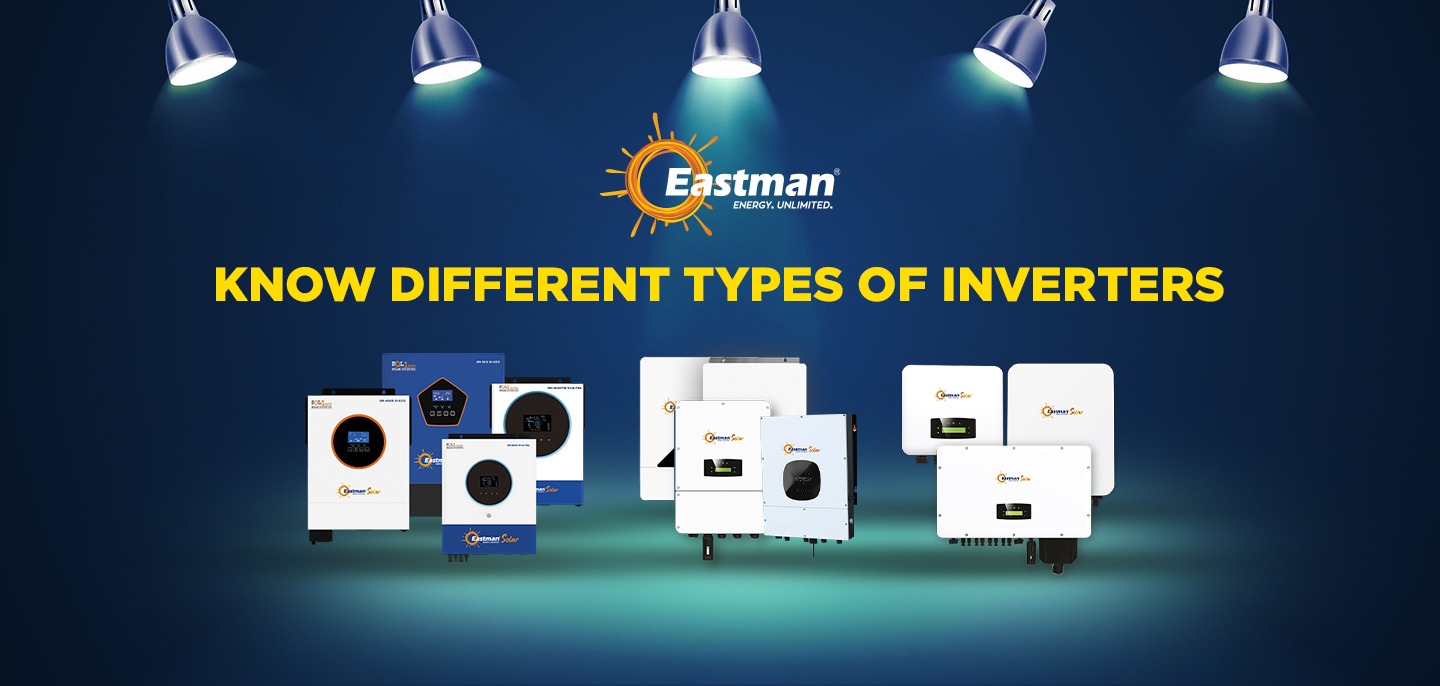
Know different Types of Inverters
As the world moves towards a more sustainable energy future, the demand for renewable energy systems is growing rapidly. Solar power, in particular, is becoming a popular choice for homeowners and businesses looking to reduce their carbon footprint and save on energy costs. However, selecting the right inverter for your solar energy system can be confusing, especially with the variety of options available, such as off-grid inverters, hybrid inverters, and grid-tie inverters. In this blog, we’ll explore these three types of inverters, their key functions, and how to choose the right one for your specific needs.
1. Off-Grid Inverters
What Are Off-Grid Inverters?
Off-grid inverters are used in systems that are completely independent of the main electrical grid. These inverters convert the DC (direct current) power generated by solar panels into AC (alternating current) power, which can be used by household appliances. In an off-grid system, the energy produced by the solar panels is stored in batteries, and the inverter draws from the batteries to provide power when needed.
Key Features of Off-Grid Inverters:
- Battery Dependence: Off-grid inverters rely on a battery bank to store excess solar energy. This makes them ideal for locations that experience frequent power outages or for remote areas where grid access is unavailable.
- Energy Independence: With an off-grid system, you are not reliant on the main utility grid, making you fully energy independent. You can generate and store your own power, allowing for greater self-sufficiency.
- Sizing Considerations: Off-grid inverters need to be sized properly to match the power consumption of the home or facility. They must also be able to manage peak load requirements.
- High Cost and Maintenance: Off-grid systems are generally more expensive due to the need for large battery banks and ongoing maintenance to ensure optimal performance.
Ideal Use Cases: Off-grid inverters are best suited for homes or businesses in remote areas without access to the grid or for those who desire complete energy independence.
2. Hybrid Inverters
What Are Hybrid Inverters?
Hybrid inverters, also known as multi-mode inverters, are designed to work with both grid-connected and off-grid systems. They offer the flexibility of storing energy in batteries while also being connected to the grid. This means that you can use solar power to run your home, store excess energy in batteries for later use, and even feed surplus power back into the grid.
Key Features of Hybrid Inverters:
- Dual Functionality: Hybrid inverters combine the benefits of grid-tied and off-grid systems. They can switch between battery power, solar energy, and grid power depending on the availability of each.
- Battery Storage: Similar to off-grid inverters, hybrid inverters allow for energy storage in batteries, which can be used during power outages or at times of high energy demand.
- Grid Interaction: Hybrid inverters can send excess solar power back to the grid, allowing homeowners to benefit from net metering or feed-in tariff programs.
- Smart Energy Management: Many hybrid inverters come with advanced monitoring systems that allow users to track energy production, consumption, and storage in real time.
Ideal Use Cases: Hybrid inverters are suitable for homeowners who want the flexibility of using stored energy during grid outages while still benefiting from the stability of being connected to the grid. They are ideal for areas where grid power is available but may be unreliable.
3. Grid-Tie Inverters
What Are Grid-Tie Inverters?
Grid-tie inverters are designed for systems that remain connected to the electrical grid. These inverters convert solar power into AC electricity and feed it directly into the grid, allowing homeowners or businesses to reduce their electricity bills by using solar energy when it’s available. Any surplus energy is sent to the grid, and consumers are credited through net metering.
Key Features of Grid-Tie Inverters:
- No Battery Storage: Unlike off-grid and hybrid inverters, grid-tie inverters do not store energy. They rely entirely on the grid to balance energy production and consumption.
- High Efficiency: Grid-tie inverters are known for their efficiency since they only manage the conversion of solar power without the complexities of battery management.
- Feed-in Tariffs and Net Metering: Grid-tie systems allow users to benefit from government incentives such as net metering or feed-in tariffs, where excess energy produced by the solar panels is sent back to the grid for financial compensation.
- Lower Costs: Since there is no need for battery storage, grid-tie inverters are more affordable compared to off-grid or hybrid systems.
Ideal Use Cases: Grid-tie inverters are ideal for homeowners or businesses located in urban or suburban areas with reliable grid access. They are perfect for those who want to lower their electricity bills by generating solar energy without investing in battery storage.
Choosing the Right Inverter for Your Needs
When choosing between off-grid, hybrid, and grid-tie inverters, consider the following factors:
- Grid Availability: If you live in a remote area with no grid access, an off-grid inverter is your best choice. If you have grid access but want backup power, a hybrid inverter is ideal. If your goal is simply to reduce your utility bills, a grid-tie inverter is the most efficient option.
- Energy Independence: For those who prioritize energy independence, off-grid or hybrid inverters are the way to go. Grid-tie inverters offer no energy independence but are more affordable and simpler to maintain.
- Cost Considerations: Off-grid systems are the most expensive due to the need for batteries. Hybrid systems fall in the middle range, while grid-tie systems are the most cost-effective.
- Backup Power Needs: If you need backup power during grid outages, hybrid or off-grid inverters are the best options since grid-tie systems don’t provide power during outages.
Conclusion
Selecting the right inverter is a critical step in building an efficient solar energy system. Off-grid inverters provide complete energy independence, hybrid inverters offer the flexibility of combining grid power and battery storage, and grid-tie inverters deliver maximum efficiency for users who want to reduce their utility bills without the need for batteries.
Whether you are seeking energy independence, reliability, or cost savings, understanding the differences between off-grid, hybrid, and grid-tie inverters will help you make the best decision for your energy needs.